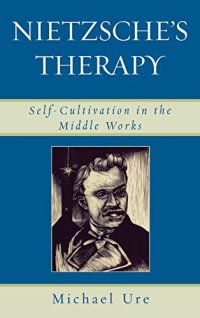
Ebook: Nietzsche's Therapy: Self-Cultivation in the Middle Works
Author: Michael Ure
- Tags: Movements Behaviorism Cognitive Behavioral Therapy Existential Gestalt Humanistic Jungian Psychoanalysis Transpersonal Psychology Criticism Philosophy Politics Social Sciences Ethics Morality Modern Humanities New Used Rental Textbooks Specialty Boutique History Surveys Clinical Developmental Neuropsychology Psychopathology Psychotherapy
- Year: 2008
- Publisher: Lexington Books
- Language: English
- pdf
Nietzsche's Therapy examines Nietzsche's middle works in order to challenge those views that dismiss his conception of self-cultivation as a symptom of unadulterated narcissism. It aims to develop a far more balanced and refined conception of his idea of self-cultivation by re-examining the much neglected free-spirit trilogy of Human, All Too Human, Daybreak, and The Gay Science. Contra Nietzsche's critics, it argues that the kind of self-cultivation that draws on the model of Hellenistic and Roman Stoic philosophical therapeia. It suggests that he renovates this therapeutic tradition through his own critical, psychoanalytic insights into narcissism and its transformations. It reconstructs Nietzsche's ethics of self-cultivation in terms of his psychological analysis of the pathological symptoms of narcissism and its healthy or positive transformations. In charting Nietzsche's course from pathological narcissism to mature individualism, Nietzsche's Therapy unpacks the philosophical and psychological basis of his critique of Rousseau and Schopenhauer's ethics of pitié/Mitleid, his use and analysis of comedy and humor in his critical, deflationary treatment of the malady of omnipotence, and his exploration of the idea of friendship as a positive counterpoint to damaged forms of intersubjectivity.
Reviews:
I cannot praise this book highly enough. It offers a set of rich insights into the texts of Nietzsche's unduly neglected 'middle period' and returns us to the congenial Nietzsche who is a great psychologist of the pathologies of human vanity and wounded narcissism and a philosopher of modesty and probity. His book succeeds in taking us beyond the aestheticist clichés that have impaired our reception and appreciation of Nietzsche in recent years. Michael Ure is a highly able and subtle reader of Nietzsche who has fresh things to say on Nietzsche's relation to Stoicism and psychoanalysis and on Nietzsche's use of the ironic and the comic. The book merits a wide readership and I am confident that it will inspire a major renewal of interest in the middle period texts both in terms of pedagogy and scholarship. (Keith Ansell Pearson, University of Warwick)
Fresh perspectives on Nietzsche are becoming increasingly hard to find, but in this book Michael Ure opens up some new and illuminating angles by taking him seriously as a philosophical therapist. Tracing significant connections with the Stoics before him and Freud and Foucault after, Nietzsche's Therapy shows its subject to be a subtle and profound practitioner of the difficult art of self-cultivation. (Graham Parkes, University College Cork; author of Composing the Soul)
This is a wise, humane, and extremely interesting work. Having discussed the influential and important work of Nehamas and Foucault on Nietzsche, Michael Ure offers a persuasive and insightful Freudian reading of Nietzsche's middle works. Contending that Nietzsche drew heavily on ancient conceptions of philosophy as a therapeutic practice whose real value is to be found in its effects on the philosopher's life outside his or her writings, Ure explores Nietzsche's psychological insights into narcissism, subjecting melancholia, revenge and pity to critiques which enable the reader to come closer to self-knowledge. Elegantly and economically written, and ending with a discussion of Nietzsche's conception of friendship, the overall effect of this book is not simply that of enriching our understanding of Nietzsche, but also that of delivering a tonic effect not usually to be found in contemporary philosophy. (Christopher Hamilton, King's College, London)
Reviews:
I cannot praise this book highly enough. It offers a set of rich insights into the texts of Nietzsche's unduly neglected 'middle period' and returns us to the congenial Nietzsche who is a great psychologist of the pathologies of human vanity and wounded narcissism and a philosopher of modesty and probity. His book succeeds in taking us beyond the aestheticist clichés that have impaired our reception and appreciation of Nietzsche in recent years. Michael Ure is a highly able and subtle reader of Nietzsche who has fresh things to say on Nietzsche's relation to Stoicism and psychoanalysis and on Nietzsche's use of the ironic and the comic. The book merits a wide readership and I am confident that it will inspire a major renewal of interest in the middle period texts both in terms of pedagogy and scholarship. (Keith Ansell Pearson, University of Warwick)
Fresh perspectives on Nietzsche are becoming increasingly hard to find, but in this book Michael Ure opens up some new and illuminating angles by taking him seriously as a philosophical therapist. Tracing significant connections with the Stoics before him and Freud and Foucault after, Nietzsche's Therapy shows its subject to be a subtle and profound practitioner of the difficult art of self-cultivation. (Graham Parkes, University College Cork; author of Composing the Soul)
This is a wise, humane, and extremely interesting work. Having discussed the influential and important work of Nehamas and Foucault on Nietzsche, Michael Ure offers a persuasive and insightful Freudian reading of Nietzsche's middle works. Contending that Nietzsche drew heavily on ancient conceptions of philosophy as a therapeutic practice whose real value is to be found in its effects on the philosopher's life outside his or her writings, Ure explores Nietzsche's psychological insights into narcissism, subjecting melancholia, revenge and pity to critiques which enable the reader to come closer to self-knowledge. Elegantly and economically written, and ending with a discussion of Nietzsche's conception of friendship, the overall effect of this book is not simply that of enriching our understanding of Nietzsche, but also that of delivering a tonic effect not usually to be found in contemporary philosophy. (Christopher Hamilton, King's College, London)
Download the book Nietzsche's Therapy: Self-Cultivation in the Middle Works for free or read online
Continue reading on any device:

Last viewed books
Related books
{related-news}
Comments (0)